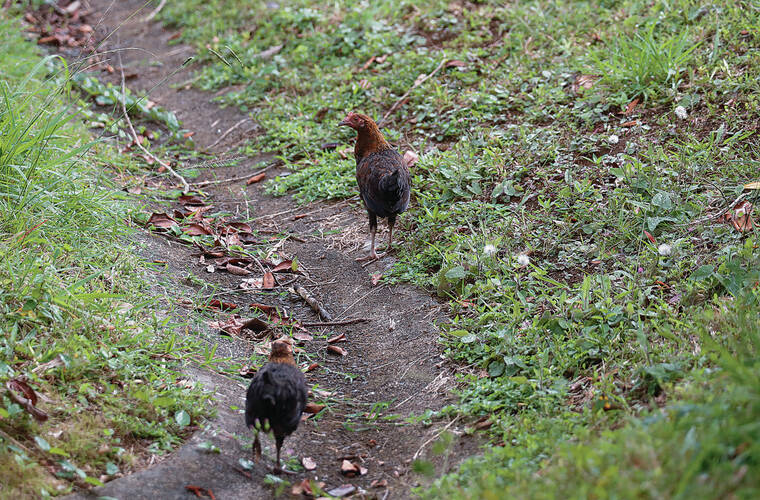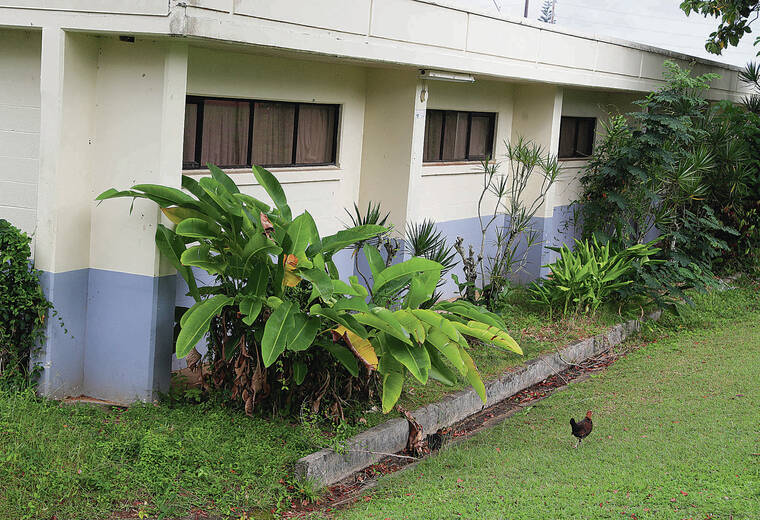A bill that would fine anyone $500 for feeding feral chickens is the latest attempt to lower the count of chicken complaints across the state.
“It seems like over the last five or 10 years, they’ve really proliferated, to the point where I started seeing feral chickens on Beretania Street downtown instead of just sort of in the back of the valleys,” said state Rep. Scot Matayoshi (D, Kaneohe-Manuawili), who introduced House Bill 72.
While neighbors have been complaining about
feral chickens for years,
Matayoshi said he was prompted to introduce
HB 72 after a former principal at Kapunahala Elementary in Kaneohe told him feral chickens had become aggressive toward students.
“One of the bigger reasons why I introduced this bill is when one of my elementary school principals approached me and said that they’ve been having so many problems with feral chickens at the elementary school and it started endangering the kids,” Matayoshi said. “The feral chickens began getting too close and getting aggressive with the elementary school kids, who some aren’t that much bigger than a feral chicken.”
Under HB 72, enforcement would rely on the state Department of Health, working with county law enforcement, to issue fines.
Aiea resident Andy Kaufman maintains that a more comprehensive approach needs to be taken to reduce Hawaii’s feral chicken population, which he said has exploded as some neighbors continue to feed them.
“In fact, we were just walking our dog last night, and there used to be maybe, like, three or four chickens that different neighbors up and down and around the block would feed,” Kaufman said. “And yesterday we counted 12 at one residence.”
Kaufman has difficulty sleeping because hens and chicks cluck.
“We close our windows at night and turn on our AC because it’s disturbing,” Kaufman said. “You can’t sleep. Just hearing them, it’s like a concert.”
Kaufman said more people need to be educated on the ramifications of feeding feral chickens.
“I think they need to have a multiprong approach to this,” Kaufman said. “It needs to be both educational to the public, and then, you know, they need to actually get rid of the population because the population has just exploded, at least in Aiea.”
Feral chickens represent a safety concern for the environment and can lead to
vehicle accidents, Kaufman said.
“There’s been close-call accidents because the hens come with their babies across the street, and people swerve and skid and it’s quite scary,” Kaufman said. “At least every couple weeks, there’s a couple dead chickens on the road from people running over them.”
Kaufman hopes the incoming Legislature passes anything that successfully addresses concerns about feral chickens.
“I just hope the (Legislature) can get something together and kind of, you know, put an end to this because it not only messes up with people’s mental health with all the crowing,” Kaufman said, “it’s a safety hazard.”
Senate Bill 2195, introduced last legislative
session, would have established a pilot program to manage the feral chicken population in the state.
SB 2195 would have required a collaboration between the state Department of Agriculture and state Department of Land and Natural Resources to establish a five-year population management pilot program to eradicate feral chickens in a humane way.
Stephanie Kendrick, director of community engagement for the Hawaiian umane Society, hopes lawmakers write an exemption to HB 72 allowing for “humane population management.”
“One of the things that we’ve been advocating for, for years as an organization, is the use of avian birth control to control the feral chicken population,” Kendrick said.
Avian birth control is not an option in Hawaii, Kendrick said.
“That is not a solution that is readily available in the state right now because the state Department of
Agriculture would have to ask for federal permission
to make that available,”
Kendrick said. “It’s a simple form. We’ve been trying to encourage them to do that, and they’ve chosen not to.”
Matayoshi understands that HB 72 won’t address all the concerns about feral chickens across the islands.
“I’m not saying this is a silver bullet,” he said. “This is not like, if you pass this bill and all the chickens are going to go away. But it’s an attempt to at least try and curb the feral chicken
population.”




